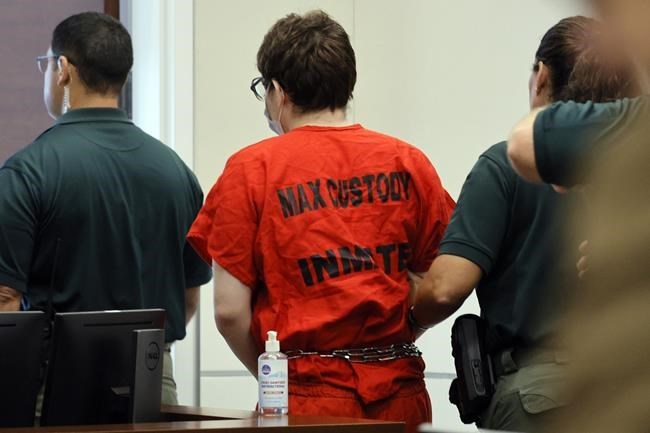FORT LAUDERDALE, Fla. (AP) — Parkland school shooter Nikolas Cruz's two-day sentencing hearing began Tuesday, with the families of the 17 people he murdered addressing him in emotional and often angry terms about the devastation he brought to their lives.
Debra Hixon — the wife of athletic director Chris Hixon, a Navy veteran who died trying to stop the Feb. 14, 2018, shooting at Marjory Stoneman Douglas High School — was the first to address Cruz. The killer wore a bright red jail jumpsuit and showed no emotion from behind a face mask.
“You stole him from us, and you did not receive the justice that you deserved," Debra Hixon said. “There is no mitigating circumstance that will outweigh the heinous and cruel way you stole him from us.”
Chris Hixon was wounded and fell to the floor, where Cruz shot him again. He spent more than 10 minutes trying to get back on his feet before he died.
“You were given a gift, a gift of grace and mercy — something you did not show to any of your victims,” Debra Hixon told Cruz. “I wish nothing for you today. After today, I don’t care what happens to you. You’ll be sent to jail, you’ll begin your punishment, you’ll be a number, and for me you will cease to exist.”
After the families of the dead and the 17 people Cruz wounded finish speaking, Circuit Judge Elizabeth Scherer will formally sentence him Wednesday to life in prison without parole. She has no other option, as the jury in his recently concluded penalty trial could not unanimously agree that the 24-year-old former Stoneman Douglas student deserved a death sentence.
The families gave highly emotional statements during the trial but were restricted about what they could tell jurors. They could describe only their loved ones and the toll the killings had on their lives. The wounded could say only what happened to them.
They were barred from addressing Cruz directly or saying anything about him — a violation would have risked a mistrial. And the jurors were told they couldn’t consider the family statements as aggravating factors as they weighed whether Cruz should die.
Now, the grieving and the scarred have the opportunity to speak directly to Cruz, if they choose.
One who will not is Fred Guttenberg, whose 14-year-old daughter Jaime was shot by Cruz in the back as she tried to flee.
He tweeted Tuesday that it won't change anything if he addresses “the monster” who murdered his daughter, the defense team he believes “gave up its humanity” to defend him or the teacher he says faked heroism. He would thank the prosecutors and others who supported the families, he said, but that won't make a difference, either.
“The reality is that I will still visit Jaime at the cemetery and the monsters fate will not change. It has already been decided. With that decision made, the monster is out of my head,” Guttenberg wrote.
He said he will think of Cruz only two more times — when he watches him being sentenced and “when I read news reporting of the prison justice that he will eventually receive."
Cruz's attorneys say he is not expected to speak. He apologized in court last year after pleading guilty to the murders and attempted murders — but families told reporters they found the apology self-serving and aimed at garnering sympathy.
That plea set the stage for a three-month penalty trial that ended Oct. 13 with the jury voting 9-3 for a death sentence — jurors said those voting for life believed Cruz is mentally ill and should be spared. Under Florida law, a death sentence requires unanimity.
Prosecutors argued Cruz planned the shooting for seven months before he slipped into a three-story classroom building, firing 140 shots with an AR-15-style semi-automatic rifle down hallways and into classrooms. He fatally shot some wounded victims after they fell. Cruz said he chose Valentine’s Day so it could never again be celebrated at Stoneman Douglas.
Cruz’s attorneys never questioned the horror he inflicted but focused on their belief that his birth mother’s heavy drinking during pregnancy left him brain damaged and condemned to a life of erratic and sometimes violent behavior that culminated in the massacre — the deadliest mass shooting to go to trial in U.S. history.
Nine other people in the U.S. who fatally shot at least 17 people died during or immediately after their attacks by suicide or police gunfire. The suspect in the 2019 massacre of 23 at a Walmart in El Paso, Texas, is awaiting trial.
Terry Spencer, The Associated Press



